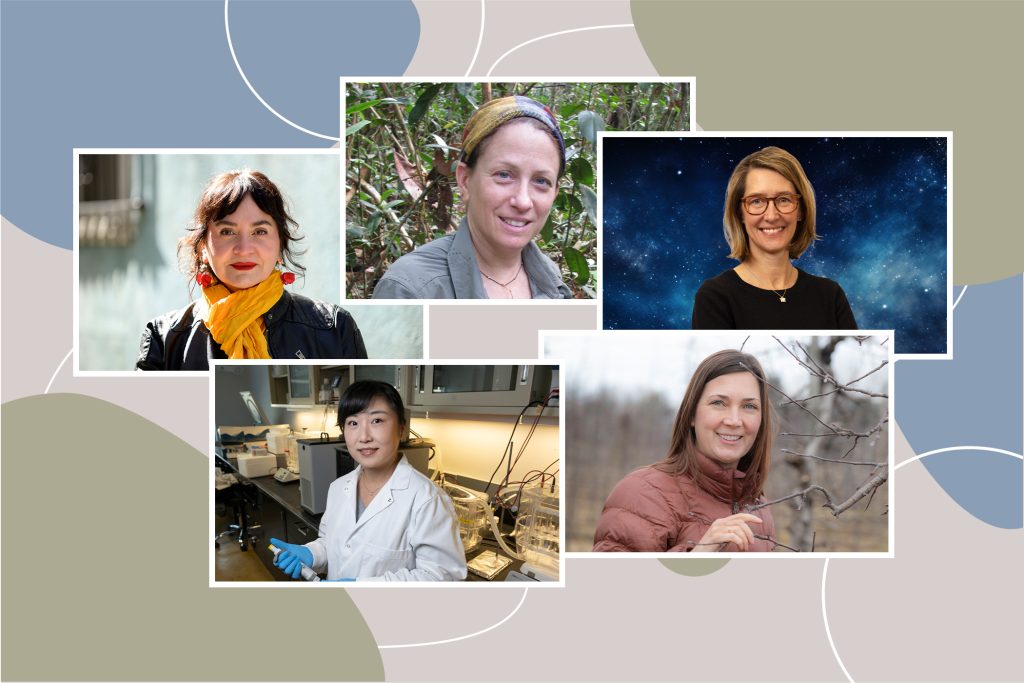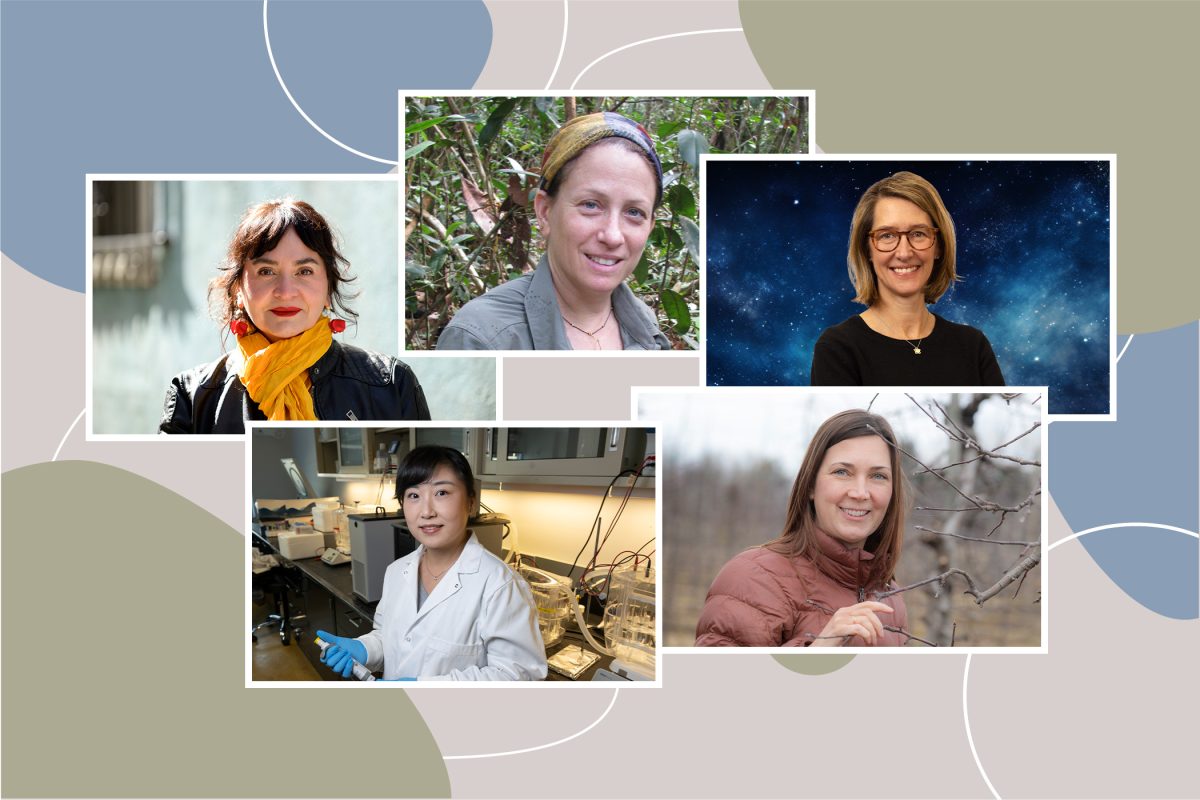
Rutgers groundbreaking women researchers are making history and making a difference in the world every day. From serving as mission head for NASA’s next space telescope to creating nanorobots to target disease and studying the survival of orangutans in Borneo – one of our closest living relatives – they are advancing our understanding of the natural and physical world around us.
For Women’s History Month, we asked some of our acclaimed scientists to share their own history of what inspired them to enter their field. Here are their stories.
A Childhood Interest in Bugs Leads to Career as a Woman in Science
Anne L. Nielsen
Associate Extension Specialist in Entomology
School of Environmental and Biological Sciences
Rutgers-New Brunswick
Somewhere in my parent’s house is a childhood video of me explaining the 17-year cicada life cycle to my much less enthused friends. I didn’t know it then, but this was an early insight into what grew into a love of insects (bugs specifically).
I grew up in a family where a passion for science was a thread that bound us together. We lived outdoors as we gardened, hiked and vacationed in national parks. Through these experiences, I gained an appreciation for the natural sciences and was convinced I would spend my adult life as a National Geographic photographer lying in wait for the perfect lion picture. That dream meandered a bit to something a bit more practical as a physical therapist or orthopedic surgeon but I didn’t lose my love of the outdoors.
I was first exposed to entomology while studying biology at Virginia Tech where I assisted in honeybee research. These tiny animals quickly fascinated me with their intricate behaviors and connections. However, it took a three-year break after college before the pull of entomology and the outdoors was too great, and I started a doctoral program at Rutgers with George Hamilton studying the life history of an invasive stink bug species. While my route to becoming a ‘Woman in Science’ wasn’t linear, the culmination of my experiences allowed me to appreciate the opportunities that led me here. Now as an extension specialist and associate professor in Entomology at Rutgers, I can integrate my passion for protecting our natural world through studying sustainable management practices to protect tree fruit from insects.
Researcher Uses DNA Like Legos in a Search for Medical Breakthroughs
Fei Zhang
Assistant Professor
Department of Chemistry
Rutgers-Newark
My research involves folding DNA in a programmable and designed way, a process called DNA origami. I like the metaphor my children use: they say I’m crafting DNA Legos on my computer and bringing them to life in the lab every day!
During my undergraduate years, a Nature paper on DNA origami introduced me to the fascinating world of using DNA to build nanostructures. DNA nanostructures are like tiny particles made from DNA. They can be used to create really small things and machines that can do tasks inside our bodies, like delivering medicine directly to sick cells. They can also be integrated into other nanotechnology, helping make electronic devices smaller and more powerful. Their potential is huge because they can be designed to do very specific tasks in medicine, opening up new ways to treat diseases and make gadgets at nanoscale. My lab has several exciting projects to create a dynamic nanorobot by using DNA. For example, we are developing a nanorobot that can capture one specific protein inside its cavity and disable the functionality of that specific protein which can be used to target diseases.
I’ve always been fascinated by the science fiction concept of nanorobots entering the human body to save lives, as seen in movies. Now, we are really working on creating such materials. I believe it is important to innovate new therapeutic approaches for the future enhancement of human health.
Since my graduate studies, I have been immersed in this fascinating research area. I’m passionate about encouraging more women to enter the research field of chemistry. By stepping into chemistry, women have the opportunity to shape the future, making discoveries that touch every aspect of our lives, from health care to environmental solutions. I advocate for more women to embark on this journey, leveraging their unique insights to drive innovation and solve pressing problems in our world.
Love of Natural Sciences Led to Career Studying Orangutans in Borneo
Erin Vogel, RCEI Affiliate
Henry Rutgers Term Chair Professor
Department of Anthropology and Center for Human Evolutionary Studies
School of Arts and Sciences
Rutgers-New Brunswick
I think the first moment that I knew I wanted to become a biologist was in my high school AP biology class when my teacher was discussing variations in anatomy from bees to mammals, and I was hooked.
I was fortunate enough in my freshman year of college to be accepted as an ornithology research assistant. I spent the next three years studying the foraging behavior of semipalmated sandpipers in the Upper Bay of Fundy in Canada – from formulating hypotheses and predictions to collecting data on the birds and their prey in the intertidal zone.
It was the scientific process that drew me into loving biology and fieldwork. After college, I had the opportunity to study birds in Costa Rica for a year and it was during that time that I observed wild primates for the first time.
For my doctoral research, I went back to Costa Rica and studied foraging behavior, food competition, and energetics in white-faced capuchin monkeys. My favorite place was to be in the field, watching these animals in their natural habitats and observing how similar they are to us humans.
It was during my postdoctoral research in Indonesia, while studying Bornean orangutans, that I began to unravel how they can survive when faced with such extreme environmental variation, both natural and as a result of the destruction of their habit by industries and threats linked to climate change.
I’ve now worked at the same field site for the past 20 years, as a co-director of the Tuanan Biological Research Station, trying to understand how a highly variable and unpredictable environment and disturbances caused by humans influence the feeding behavior, nutrition, energetics, and consequential health of wild orangutans.
Together with my Indonesian colleagues and the many graduate and undergraduate students I have had the privilege of working with, we are beginning to unravel how variation in macronutrient intake can have profound effects on body composition, immunity, and overall health in one of our closest living relatives. My biggest joy now is being able to take trainees into the field with me and share this amazing place with undergraduate and graduate students, and postdoctoral fellows that I have had the privilege of working with and exploring biological questions with over the years.
After a Detour to Start a Family, Astronomer Now Serves as Mission Head for Newest NASA Telescope
Kristen McQuinn
Assistant Professor Department of Physics and Astronomy
School of Arts and Sciences
Rutgers-New Brunswick
My story goes all the way back to high school. I had this phenomenal high school physics teacher. It all just clicked. I started as a physics major at Lehigh University, but I switched to engineering when I was advised that it would be easier to find a job. After graduation, I worked as an engineering intern and decided not to continue that path.
I took a corporate consulting job, which at the time defined success for me. I worked there in different roles for about ten years. I did well, but I didn’t feel as though I was thriving.
I started reading astrophysics books at night. I was exposed to astronomy news coming from NASA and the study of the universe was fascinating to me. I revisited the advice I had received in college and decided to turn it around. There might be few jobs in physics. But all I had to do was get that one job.
I started in a doctoral program in astrophysics [the branch of astronomy that applies the laws and theories of physics to astronomical observations] and realized how much I loved it. Two years in, about to give birth to my first child, I decided to step away from academics temporarily. I had two children and then was accepted back at a different university to continue my doctoral studies. My husband had a very time-intensive job, so I was fortunate to be able to continue my studies part-time. When the children grew older, I became a full-time postdoctoral scholar, and then worked my way up in the academy.
Now, I’m where I want to be. I’m a faculty member in the physics and astronomy department at Rutgers and mission head of the science operations center for NASA’s next flagship telescope, the Nancy Grace Roman Space Telescope.
Ecologist Who Finished Her Ph.D. While Raising a Toddler Encourages Women to Never Give Up
Angélica L. González
Associate Professor and Biology Graduate Program Director
Department of Biology and Center for Computational and Integrative Biology
Rutgers-Camden
I have been interested in science for as long as I can remember. My parents nurtured in us the spirit of curiosity and a fascination for the natural world. I also got to discover the world through visits to diverse museums and reading books that our parents bought us. One of these books was Twenty Thousand Leagues Under the Sea by Jules Verne. I remember being fascinated by the adventures of the Nautilus travelling through the world’s seas and finding amazing deep-sea creatures.
As a kid, however, I was not aware of a branch of biology called ecology. It was not until my sophomore year, when I took a class in ecology that blew my mind and was fundamental in me becoming an ecologist. I felt in awe learning about the diversity of ecological phenomena, their complexity, and their resilience as well as their vulnerability to rapid changes in the environment; all that understanding grounded on empirical evidence. After that I knew I wanted to follow a path in academia, become a scientist, and help advance our understanding of ecological systems. I got a master’s in zoology, later a Ph.D in ecology and two postdoctoral positions before joining the faculty at Rutgers.
My biggest accomplishment is when I earned my Ph.D. The journey was not easy as I was at the same time raising a toddler. The process requires years of dedication, perseverance, and rigorous as well as time-consuming research with little schedule flexibility. The exhaustion due to chronic sleep deprivation was at times so intense that it was hard to function properly. In the end, I emerged victorious in my pursuit of knowledge and academic excellence. The journey was a transformative experience that presented me with an opportunity to grow, develop unwavering determination, and build a resilient mind. Despite this sense of accomplishment, I still feel guilt for the innumerable hours I took away from my child and dedicated to my research.
I think it is crucial that we increase the number of women in biology, but this issue goes beyond just a numbers game. Everybody should have a shot at bringing their unique perspectives and brilliant ideas to research in biology. I want to tell women to explore multiple possibilities early in their careers, to challenge themselves and learn something new every day, to foster their curiosity, to not give up despite the obstacles, to seek mentorship and guidance, to help break down barriers, and to never ever doubt that their success is due to their own merits.




